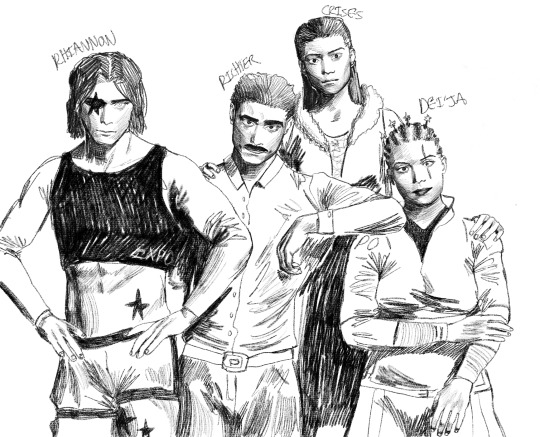#crises
Explore tagged Tumblr posts
Text
Donate to help

#help with money#d0nations#gofundme#north africa#libya#arab#weather#weather news#storm#storm daniel#9/11#september 2023#crises#weather crises
1K notes
·
View notes
Text
You have to take care of your own heart. You were not meant to carry the pain of the entire world. Do what you can for others, because you owe it to them, but be realistic with what you can achieve. If you’re already going to protests, donating money, working for liberation, holding power to account, taking care of the worst affected - then breathe. Take a step back and stop doomscrolling or endlessly refreshing your news app. Go for a walk in the woods. Eat your favourite chocolate. Watch a film with a loved one. Sleep. I promise you all the agony and cruelty and suffering will still be there when you get back. But maybe you’ll have a little more strength to fight them if you’ve remembered to keep tending the fires of joy inside you. You save no-one by letting them go out.
#hopepunk#crises#social justice#optimism#community#self care#bad news#compassion fatigue#burnout#love#solarpunk
843 notes
·
View notes
Text

Why yes, dash serendipity, I do think a swishing cat tail could cure my midlife crisis.
[ID: A screenshot of two tumblr posts that showed up together on my dash; the top is from screenshots of despair and reads "Ideas for you: Midlife Crisis." Directly below this is a post by straycatj, showing a paused video of the titular J-san's tail, stopped mid wag, captioned "It's my tail while drinking water."]
75 notes
·
View notes
Text

tfw your husband gets turned to stone and now you must drag your bratty son across the planet to kill the mf who did it while bonding along the way
9 notes
·
View notes
Text
Más chorradillas de #lailiada y #laodisea Conocí una profe de griego llamada Penélope a la que apodaban Popi.
Translation:
#1 Euri: But Capta-!
Ody: Why won't you shut up?
#2 Crises: Atrides and Achaeans with beautiful greaves!
Greeks: Oh he noticed! Let him pass. I just polished mine.
#3 Ody: Couldn't care less about these guys. I wanna go home. Popi, I miss you T^T What am I doing here?
#odysseus #polites #eurylochus #achilles #agamemnon #odiseo #polities #euriloco #aquiles #agamenon #crises #theilliad #theodyssey #epicthemusical
#odysseus#polites#eurylochus#achilles#agamemnon#odiseo#polities#euriloco#aquiles#agamenon#crises#the illiad#the odyssey#epic the musical#epic the musical memes
7 notes
·
View notes
Text

Mike Oldfiled - Crises, 1982
14 notes
·
View notes
Text

EPIC ALBUM COVER #115
Mike Oldfield - Crises
Released: 1983 (Virgin)
New age, progressive rock, progressive pop
Suggested by anon.
#epic album cover#music#album cover#mike oldfield#crises#progressive pop#progressive rock#prog rock#new age#pop rock#art rock#suggestion
7 notes
·
View notes
Text
““If anyone is being detained or removed based on the administration’s assertion that it can do so without judicial review or due process,” said Jamal Greene, a law professor at Columbia, “the president is asserting dictatorial power and ‘constitutional crisis’ doesn’t capture the gravity of the situation.”
Mr. Trump raised the stakes on Tuesday by calling for the impeachment of the judge who issued the order, James E. Boasberg of the Federal District Court in Washington, describing him on social media as a “Radical Left Lunatic.”
The president did so even as the issues at hand have just started to be tested in a case that seems headed to the Supreme Court.
A few hours later, Chief Justice John G. Roberts Jr. issued an unusual statement, seemingly prompted by such exhortations, and perhaps by the filing of articles of impeachment against Judge Boasberg by a Republican member of the House.
“For more than two centuries, it has been established that impeachment is not an appropriate response to disagreement concerning a judicial decision,” the chief justice said. “The normal appellate review process exists for that purpose.”
(…)
Aziz Huq, a law professor at the University of Chicago, said that assessing whether a given development is a constitutional crisis is “generally unhelpful.”
“I think it’s more useful to say that this is moving us into a completely different kind of constitutional order, one that’s no longer characterized by laws that bind officials and that can be enforced,” Professor Huq said. “The law, in other words, becomes a tool to harm enemies, but not to bind those who govern. That is a quite different constitutional order from the one that we’ve had for a long time.”
(…)
“It should go without saying that, at the Justice Department, the rule of the road is that, in the absence of a true emergency, the government complies with judicial orders, even if the orders are patently lawless, until it can get them reversed — either by the issuing judge or a higher court,” Andrew C. McCarthy, a former federal prosecutor, wrote in the right-leaning National Review. “It’s all right to complain bitterly about court orders, but they are not to be ignored, much less knowingly flouted.”
(…)
The lawyer representing the government at Monday’s hearing had another argument: that Judge Boasberg was powerless to order the planes to turn around once they had left American airspace. That assertion was also labeled unconvincing by many legal experts.
“The administration has this completely wrong,” Hannah L. Buxbaum, a law professor at Indiana University, wrote in a blog post. “The judge is ordering the administration to take action inside the United States — that is, to instruct the planes to turn around. That instruction will in turn cause something to happen elsewhere (the pilots will change course), but that doesn’t make the order impermissibly extraterritorial.”
(…)
Pamela S. Karlan, a law professor at Stanford, said the development was emblematic of how the Trump administration had acted in its first months in office.
“The problem with this administration is not just acute episodes, like what’s happening with Judge Boasberg and the Venezuelan deportation,” Professor Karlan said. “It’s a chronic disrespect for constitutional norms and for the other branches of government.”
Asked whether the nation had reached a tipping point plunging it into a constitutional crisis, Professor Karlan questioned the premise. “‘Tipping point’ suggests a world in which things are fine until suddenly they’re not,” she said. “But we’re past the first point already.””
“It is not hyperbole to say that the future of American constitutional democracy now rests on a single question: Will President Trump and his administration defy court orders?
Federal judges have issued more than a dozen temporary restraining orders and preliminary injunctions against Trump administration actions. But it is unclear whether the government will comply, and in at least two cases, judges have said their orders were ignored.
The Trump administration is already facing at least 100 legal challenges. Two recent court orders no doubt will test Mr. Trump’s patience.
(…)
But the hard truth for those looking to the courts to rein in the Trump administration is that the Constitution gives judges no power to compel compliance with their rulings — it is the executive branch that ultimately enforces judicial orders. If a president decides to ignore a judicial ruling, the courts are likely rendered impotent.
(…)
Removing federal judges because of disagreement with their rulings would be unprecedented. The Constitution allows for impeachment only for “treason, bribery, or other high crimes and misdemeanors.” There is no plausible basis for claiming that standard has been met. And it is risible to see conservatives, who repeatedly went to court to enjoin Biden and Obama administration policies, now saying that the judiciary should not review executive branch actions. All of this is about an administration that does not want to be constrained by the Constitution, laws or courts.
It is unsettling even to be asking whether the president would defy a court order. Throughout American history, presidents have complied with mandates from the courts, even when they disagree. In the 1930s, the Supreme Court struck down many of the New Deal programs of Franklin Roosevelt. He was angry and proposed expanding the size of the Supreme Court to uphold his initiatives, but never went as far as defying the rulings. When the Supreme Court declared unconstitutional Harry Truman’s order to seize steel mills during the Korean War, a major blow to his presidency, Truman, too, was angry, but he complied with the decision.
Similarly, when the court ordered Richard Nixon to turn over the White House tapes, he did so even though it meant the end of his presidency. More recently, when courts blocked Biden administration policies — from student loan relief to vaccine mandates — the White House complied.
(…)
But there are no definitive instances of presidents disobeying court orders. The line attributed to Andrew Jackson about the chief justice, that “John Marshall has made his decision, now let him enforce it,” is likely apocryphal. Purportedly about a Supreme Court ruling that Georgia could not enforce its laws against whites on Cherokee land, the quotation did not appear in print until long after Jackson’s death. And, in fact, the court order was directed at Georgia, not Jackson or the federal government. In addition, modern scholarship has undermined the story that Abraham Lincoln defied an order from the chief justice invalidating a suspension of habeas corpus during the early days of the Civil War.
Thus far, the Trump administration has given conflicting signals as to whether it will defy court orders. On Feb. 11, Mr. Trump said, “I always abide by the courts, and then I’ll have to appeal it.” And that same month, the acting solicitor general, Sarah Harris, wrote in a footnote in a brief to the Supreme Court: “The executive branch takes seriously its constitutional duty to comply with the orders of Article III courts.”
But just one day prior, Mr. Trump posted on social media, “He who saves his Country does not violate any Law.” A week earlier, Vice President JD Vance posted, “Judges aren’t allowed to control the executive’s legitimate power,” implying that the president decides what is “legitimate.” This follows a history of assertions by Mr. Vance suggesting that the president need not comply with adverse court rulings. And while this did not involve a court order, in January, in one of his first acts in office, Mr. Trump signed an executive order to delay enforcing a federal ban on TikTok, even though that ban had just been upheld by a unanimous Supreme Court.
The reality — and Mr. Trump and those around him know it — is that he could get away with defying court orders should he, ultimately, choose to do so. Because of Supreme Court decisions, Mr. Trump cannot be held civilly or criminally liable for any official acts he takes to carry out his constitutional powers.
Those in the Trump administration who carry out his policies and violate court orders could be held in contempt. But if it is criminal contempt, Mr. Trump can issue them pardons. Although civil contempt can involve being jailed until the person complies with the court order, that is enforced by the United States marshals, who are part of the Department of Justice and thus under the president’s control.
Defiance of court orders could be the basis for impeachment and removal. But with his party in control of Congress, Mr. Trump knows that is highly unlikely to happen.
If the Trump administration chooses to defy court orders, we will have a constitutional crisis not seen before. Perhaps public opinion will turn against the president and he will back down and comply. Or perhaps, after 238 years, we will see the end of government under the rule of law.”
““Honest to god, I’ve never seen anything like it,” said Steven Levitsky, a Harvard political scientist and coauthor of “How Democracies Die” and “Competitive Authoritarianism.”
“We look at these comparative cases in the 21st century, like Hungary and Poland and Turkey. And in a lot of respects, this is worse,” he said. “These first two months have been much more aggressively authoritarian than almost any other comparable case I know of democratic backsliding.”
(…)
Mr. Levitskysaid he was struggling to find a precedent for what the Trump administration is doing.
“The zeal with which these guys are engaging in increasingly open, authoritarian behavior is unlike almost anything I’ve seen. Erdogan, Chavez, Orban — they hid it,” Mr. Levitsky said.
(…)
The Trump administration’s tactics are highly unusual, said Andrew O’Donohue, a nonresident scholar at the Carnegie Endowment for International Peace, who studies clashes between courts and elected leaders around the world. Typically, battles over court power have tended to be extensions of political divisions.
(…)
But Mr. Trump and the federal courts are not ideological foes in the same way. Federal judges hold a range of views, but the judiciary has grown more conservative in recent decades. And the Supreme Court, which has a conservative majority, has delivered the political right a number of significant legal victories in recent years, including granting presidents sweeping immunity from criminal prosecution.
(…)
Usually, voters won’t reward their elected leaders for violating norms, disrupting a stable constitutional order, or taking actions that are intrinsically unlawful, said Aziz Huq, a law professor at the University of Chicago and co-author of the book “How to Save a Constitutional Democracy.”
But that calculus may not apply to Mr. Trump, who has based his political appeal on gleefully flouting sacrosanct norms. Refusing to accept courts’ authority may actually appeal to the president’s base, Huq said, if they take it as evidence of strength rather than lawlessness.
Past presidents have also been more constrained by elites within the political establishment.
“Richard Nixon had to care not just about public opinion, but Walter Cronkite, and Republican and Democratic Party leaders,” Mr. Levitsky said. “That constraint, which was difficult to measure, but I think very real in the 20th century, has lifted.”
(…)
“If even a dozen Republicans in Congress had the capacity to stand up to Trump, this would be a very different ballgame,” Mr. Levitsky said. “Trump and Musk and Stephen Miller could not do this alone. They’re doing it with the full cooperation of the majority party in Congress.”
“We’re in a bad place,” he said.”
“In a book written about 30 years ago, I defined a revolution as “the destruction of an existing state by members of its own society, followed by the creation of a new political order.” Although the ultimate impact of Trumpism remains to be seen, at first glance his aspirations (and those of his supporters) appear to fit that definition. As the past two months have made abundantly clear, U.S. President Donald Trump isn’t just trying to modify or reverse the policies of his predecessors. All presidents do that to some degree. Rather, he and his supporters are seeking to destroy or radically alter some of the key institutions that have governed the United States for decades, including the meaning of the Constitution itself. They are also attempting to implement far-reaching—indeed, revolutionary—changes to key aspects of U.S. foreign policy, moves far more fundamental than Richard Nixon’s outreach to China or George W. Bush’s ill-fated effort to transform the Middle East.
(…)
The good news is that Trumpism isn’t a mass movement like the ones that toppled the Bourbons, the Romanovs, or the Pahlavis, and Trump isn’t that kind of revolutionary leader. Trumpism is a “revolution from above,” where disenchanted members of the elite (frequently the military) gain power and replace key elements of the old order with new ones. In this sense, it is more like the Turkish revolution led by Mustafa Kemal Ataturk (a disaffected Ottoman general), the Egyptian revolution led by Gamal Abdel Nasser and the “Free Officers” (more disaffected military leaders), or the Meiji Restoration in Japan. “Revolutions from above” can also lead to conflict and war, but they tend to be less disruptive than mass revolutions “from below.”
Nor is Trumpism likely to prove contagious. Trump and allies like Steve Bannon have made common cause with autocrats or illiberal democrats such as Crown Prince Mohammed bin Salman of Saudi Arabia, Prime Minister Viktor Orban of Hungary, and former President Jair Bolsonaro in Brazil, and the administration has shown a strong affinity for right-wing extremists such as the Alternative für Deutschland in Germany and the National Rally in France, but these movements predate Trumpism and were not inspired by him. Trump hasn’t invented a radically new revolutionary model; he’s just following the playbook for democratic backsliding and self-dealing perfected by leaders like Orban or Turkey’s Recep Tayyip Erdogan. Having the world’s most powerful country lined up with these autocrats is significant, but we’ve seen this movie many times before. And it is worth noting that Trump’s early moves have helped mainstream parties in several places, most notably Canada, Germany, and Great Britain. The French Revolution it ain’t.
It is more accurate to think of Trump not as a revolutionary leader advancing a radically new and potentially contagious model for the world, but as a reactionary leader seeking to turn the clock back. The “MAGA” slogan gives the game away: If you’re claiming to make the country great again, your gaze is firmly fixed in the rearview mirror and not on the future.
Instead of the managed free trade that fueled seven decades of economic growth, he wants import taxes (aka tariffs) like the ones that President William McKinley imposed more than a century ago. Instead of racial and gender equality and tolerance for other minorities, he wants a return to white supremacy and traditional gender roles. Instead of sustained global engagement guided by international law and collaborative multilateral institutions in which Washington plays a leading role, he wants to disengage. Instead of great-power competition constrained by norms, he wants the great powers to be free to grab whatever they can, just as they did a century ago. Instead of freedom of speech and patriotic dissent, he wants a muzzled press, subservient universities, and the ability to deport legal residents solely because of their political views. Instead of presiding over a diverse nation whose energies are renewed by the arrival of ambitious immigrants, he wants an America surrounded by walls, where only some of the people born here are citizens. Instead of public policy based on science and evidence, he wants the “facts” to be whatever he and Robert F. Kennedy Jr. say they are.
Apart from the peculiarly destructive role that Elon Musk is playing in this process, there is nothing new or revolutionary about any of this. It’s the familiar autocrat’s playbook that has been perfected and pursued in many other places—usually to their detriment—just not here in the United States. Lest we forget: The United States was founded in a revolution against this way of running a country, and it has moved closer to those stated ideals over time. Until now. On the eve of the 250th anniversary of the Declaration of Independence, it would be tragic indeed if what we end up celebrating next year is not the revolutionary principles contained in that document, but rather their demise.”
3 notes
·
View notes
Text

More recent listening…
Songs of Distant Earth, Platinum, Amarok & Crises.
4 notes
·
View notes
Video
youtube
Não Será Possível Esconder-se Num Ecobunker
2 notes
·
View notes
Text

"Whiskey Pete" Hegseth runs the Department of Defense.
MAGA morons may think it's fun to have a drunken lout with access to a massive arsenal. But the often inebriated Richard Nixon should serve as a warning as to what might happen when a problem drinker is making national security decisions.
That Time a Drunk Richard Nixon Tried to Nuke North Korea
That Time the Middle East Exploded—and Nixon Was Drunk
#pete hegseth#whiskey pete#pentagon#department of defense#trump administration#maga#alcohol#drinking problem#drunk#problem drinkers#crises#richard nixon#middle east#north korea#republicans
5 notes
·
View notes
Text
Keep Libya in your prayers 🤲🏻🇱🇾





#libya#north africa#arab#weather#storm#rainstorm#storm daniel#floods#rain#news#weather news#september 2023#9/11#humanitarian crises#crises#weather crises
62 notes
·
View notes
Text
Please officer I’m a schizophrenic. I know you don’t understand but don’t shoot me in the chest and kill me, I’m a good soul. I’m just sick. Please just shoot me in the leg. Why do you have to take my life. It’s not fair I didn’t want this for my life. I had dreams of finishing college and making a life for my self. Yet I have this illness that killing me from the inside and I heard you were suppose to protect and serve. I haven’t had a meal in days and I’ve been out in the weather. Do you think you could offer me something to eat and maybe some water and I just might surrender peacefully. Please don’t kill me please officer I’m a schizophrenic.
#kingofkingsschizo#schizophrenia#police shooting#killing me#crises#life and death#hallucinations#delusions#a matter of life and death#education#policetraining#new policy#wrongfuldeath#vote for your life#go vote#protect and serve#follow
17 notes
·
View notes
Text

15 notes
·
View notes
Text

10 notes
·
View notes
Text
no minimo duas vezes ao dia eu tenho vontade de apagar todas redes sociais, excluir todos contatos, fechar a cara e nunca mais ser intimo de ninguem. simplesmente experienciar uma vida quieta, sozinha solitaria, monótona, mediocre.
5 notes
·
View notes